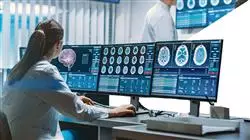University certificate
The world's largest artificial intelligence faculty”
Introduction to the Program
Join this 100% online program now, where you will delve into Machine Learning Algorithms and their applications in Medical Research"

AI Algorithms play a key role in establishing personalized therapeutic treatments. This set of computer-defined instructions uses clinical as well as biomedical or genetic data to develop predictive models. In this way, specialists apply personalized therapies and can predict responses to treatments so that they have a higher probability of success. In addition, these tools can accurately calculate drug doses, which improves the efficacy of approaches.
In this context, TECH is creating an advanced program that will delve into the use of Machine Learning during the planning and execution of medical procedures. Under the guidance of a well-versed faculty, this curriculum will analyze pattern recognition and Machine Learning in clinical diagnostics. Therefore, specialists will correctly interpret medical images to provide the most appropriate treatments for each individual. The syllabus will also provide comprehensive skills on the most innovative therapeutic protocols. In this line, the didactic materials will offer the latest advances in assisted surgical robotics so that graduates will remain at the technological forefront.
In addition, the program's methodology will be a reference in the field of robotic assisted surgery. With a 100% online format, it will allow graduates to advance in their specialization without compromising their job responsibilities. In addition, the application of the Relearning system, based on the reiteration of key concepts, ensures a deep and lasting understanding. This pedagogical approach reinforces the ability of professionals to effectively apply the knowledge acquired in their daily practice. In turn, the only thing physicians will need to complete this academic pathway will be a device with Internet access and a commitment to update their knowledge that will allow them to experience a leap in quality in their careers.
You will apply Artificial Intelligence to respond to health emergencies such as epidemiological outbreaks and in the development of new vaccines”
This Postgraduate diploma in Diagnosis, Treatment and Personalization of Medical Treatment with Artificial Intelligence contains the most complete and up-to-date program on the market. The most important features include:
- Development of practical cases presented by experts in Artificial Intelligence in Clinical Practice
- The graphic, schematic, and practical contents with which they are created, provide scientific and practical information on the disciplines that are essential for professional practice
- Practical exercises where self-assessment can be used to improve learning
- Its special emphasis on innovative methodologies
- Theoretical lessons, questions to the expert, debate forums on controversial topics, and individual reflection assignments
- Content that is accessible from any fixed or portable device with an Internet connection
You will promote patient autonomy through active participation in the design of personalized treatments following the study of this program”
The program’s teaching staff includes professionals from the sector who contribute their work experience to this program, as well as renowned specialists from leading societies and prestigious universities.
The multimedia content, developed with the latest educational technology, will provide the professional with situated and contextual learning, i.e., a simulated environment that will provide immersive education programmed to learn in real situations.
This program is designed around Problem-Based Learning, whereby the professional must try to solve the different professional practice situations that arise during the academic year For this purpose, the students will be assisted by an innovative interactive video system created by renowned and experienced experts.
You will perform multimodal clinical data integrations to achieve more accurate diagnoses"

You will have access to a learning system based on repetition, with natural and progressive teaching throughout the entire syllabus"
Syllabus
This program will delve into the diagnosis, treatment and personalization of AI medical therapies. Designed by experts in this field, the curriculum will delve into pattern recognition and Machine Learning for medical assessment. The syllabus will also delve into assisted treatment systems, taking into account machine learning algorithms for the establishment of therapeutic processes. The materials will also analyze the applications of intelligent automation in fields such as pharmacogenomics. In addition, the program will enable physicians to master the design of personalized therapies based on the needs of their patients.

Enjoy the most up-to-date medical-scientific content on the educational scene without time restrictions or unnecessary trips to a study center"
Module 1. Diagnosis in Clinical Practice Using Artificial Intelligence
1.1. Technologies and Tools for AI-assisted Diagnosis
1.1.1. Development of Software for AI-assisted Diagnosis in Various Medical Specialties
1.1.2. Use of Advanced Algorithms for Rapid and Accurate Analysis of Clinical Symptoms and Signs
1.1.3. Integration of AI in Diagnostic Devices to Improve Efficiency
1.1.4. AI Tools to Assist in the Interpretation of Laboratory Test Results
1.2. Integration of Multimodal Clinical Data for Diagnosis
1.2.1. AI Systems for Combining Imaging, Laboratory, and Clinical Record Data
1.2.2. Tools for Correlating Multimodality Data into More Accurate Diagnoses
1.2.3. Use of AI to Analyze Complex Patterns from Different Types of Clinical Data
1.2.4. Integration of Genomic and Molecular Data in AI-assisted Diagnosis
1.3. Creation and Analysis of Health Datasets with AI
1.3.1. Development of Clinical Databases for Training AI Models
1.3.2. Use of AI for Analysis and Extraction of Insights from Large Health Datasets
1.3.3. AI Tools for Clinical Data Cleaning and Preparation
1.3.4. AI Systems for Identifying Trends and Patterns in Health Data
1.4. Visualization and Management of Health Data with AI
1.4.1. AI Tools for Interactive and Understandable Visualization of Health Data
1.4.2. AI Systems for Efficient Management of Large Volumes of Clinical Data
1.4.3. Use of AI-based Dashboards for Monitoring of Health Indicators
1.4.4. AI Technologies for Health Data Management and Security
1.5. Pattern Recognition and Machine Learning in Clinical Diagnostics
1.5.1. Application of Machine Learning Techniques for Pattern Recognition in Clinical Data
1.5.2. Use of AI in the Early Identification of Diseases through Pattern Analysis
1.5.3. Development of Predictive Models for More Accurate Diagnoses
1.5.4. Implementation of Automatic Learning Algorithms in the Interpretation of Health Data
1.6. Interpretation of Medical Images Using AI
1.6.1. AI Systems for Anomaly Detection and Classification of Medical Image Anomalies
1.6.2. Use of Deep Learning in the interpretation of X-rays, MRI and CT scans
1.6.3. AI Tools for Improving Accuracy and Speed in Diagnostic Imaging
1.6.4. Implementation of AI for Image-Based Clinical Decision-Making Assistance
1.7. Natural Language Processing on Medical Records for Clinical Diagnosis
1.7.1. Use of NLP for the Extraction of Relevant Information from Medical Records
1.7.2. AI Systems for Analyzing Physician Notes and Patient Reports
1.7.3. AI Tools for Summarizing and Classifying Information from Medical Records
1.7.4. Application of NLP in Identifying Symptoms and Diagnoses from Clinical Texts
1.8. Validation and Evaluation of AI-assisted Diagnostic Models
1.8.1. Methods for Validation and Testing of AI Models in Real Clinical Environments
1.8.2. Evaluation of the Performance and Accuracy of AI-assisted Diagnostic Tools
1.8.3. Use of AI to Ensure Reliability and Ethics in Clinical Diagnosis
1.8.4. Implementation of Continuous Assessment Protocols for AI Systems in Health Care
1.9. AI in the Diagnosis of Rare Diseases
1.9.1. Development of AI Systems Specializing in the Identification of Rare Diseases
1.9.2. Use of AI to Analyze Atypical Patterns and Complex Symptomatology
1.9.3. AI Tools for Early and Accurate Diagnosis of Rare Diseases
1.9.4. Implementation of Global Databases with AI to Improve Diagnosis of Rare Diseases
1.10. Success Stories and Challenges in AI Diagnostics Implementation
1.10.1. Analysis of Case Studies Where AI Has Significantly Improved Clinical Diagnosis
1.10.2. Assessment of the Challenges in the Adoption of AI in Clinical Settings
1.10.3. Discussion of Ethical and Practical Barriers in Implementing AI for Diagnosis
1.10.4. Examination of Strategies to Overcome Obstacles in Integrating AI in Medical Diagnostics
Module 2. Treatment and Management of the Artificial Intelligence Patient
2.1. AI-assisted Treatment Systems
2.1.1. Development of AI Systems to Assist in Therapeutic Decision Making
2.1.2. Use of AI for the Personalization of Treatments Based on Individual Profiles
2.1.3. Implementation of AI Tools in the Administration of Dosage and Medication Scheduling
2.1.4. Integration of AI in Real-Time Monitoring and Adjustment of Treatments
2.2. Definition of Indicators for Monitoring Patient Health Status
2.2.1. Establishment of Key Parameters using AI for Patient Health Monitoring
2.2.2. Use of AI to Identify Predictive Indicators of Health and Disease
2.2.3. Development of Early Warning Systems Based on Health Indicators
2.2.4. Implementation of AI for Continuous Assessment of Patient Health Status
2.3. Tools for Monitoring and Controlling Health Indicators
2.3.1. Development of AI-enabled Mobile and Wearable Applications for Health Monitoring
2.3.2. Implementation of AI Systems for the Real-Time Analysis of Health Data
2.3.3. Use of AI-based Dashboards for Visualization and Monitoring of Health Indicators
2.3.4. Integration of IoT Devices in the Continuous Monitoring of Health Indicators with AI
2.4. AI in the Planning and Execution of Medical Procedures
2.4.1. Use of AI Systems to Optimize the Planning of Surgeries and Medical Procedures
2.4.2. Implementation of AI in the Simulation and Practice of Surgical Procedures
2.4.3. Use of AI to Improve Accuracy and Efficiency in the Execution of Medical Procedures
2.4.4. Application of AI in Surgical Resource Coordination and Management
2.5. Machine Learning Algorithms for the Establishment of Therapeutic Treatments
2.5.1. Use of Machine Learning to Develop Personalized Treatment Protocols
2.5.2. Implementation of Predictive Algorithms for the Selection of Effective Therapies
2.5.3. Development of AI Systems for Real-time Tailoring of Treatments
2.5.4. Application of AI in the Analysis of the Effectiveness of Different Therapeutic Options
2.6. Adaptability and Continuous Updating of Therapeutic Protocols Using AI
2.6.1. Implementation of AI Systems for Dynamic Review and Updating of Treatments
2.6.2. Use of AI in Adaptation of Therapeutic Protocols to New Findings and Data
2.6.3. Development of AI Tools for Continuous Personalization of Treatments
2.6.4. Integration of AI in Adaptive Response to Evolving Patient Conditions
2.7. Optimization of Healthcare Services with AI Technology
2.7.1. Use of AI to Improve the Efficiency and Quality of Health Care Services
2.7.2. Implementation of AI Systems for Healthcare Resource Management
2.7.3. Development of AI Tools for Workflow Optimization in Hospitals
2.7.4. Application of AI in the Reduction of Waiting Times and Improvement of Patient Care
2.8. Application of AI in the Response to Health Emergencies
2.8.1. Implementation of AI Systems for Rapid and Efficient Healthcare Crisis Management
2.8.2. Use of AI in Optimizing the Distribution of Resources in Emergencies
2.8.3. Development of AI Tools for Disease Outbreak Prediction and Response
2.8.4. Integration of AI in Warning and Communication Systems during Health Emergencies
2.9. Interdisciplinary Collaboration in AI-assisted Treatments
2.9.1. Promotion of Collaboration between Different Medical Specialties through AI Systems
2.9.2. Use of AI to Integrate Knowledge and Techniques from Different Disciplines in Treatment
2.9.3. Development of AI Platforms to Facilitate Interdisciplinary Communication and Coordination
2.9.4. Implementation of AI in the Creation of Multidisciplinary Treatment Teams
2.10. Successful Experiences of AI in the Treatment of Diseases
2.10.1. Analysis of Successful Cases in the Use of AI for Effective Treatment of Diseases
2.10.2. Evaluation of the Impact of AI in Improving Treatment Outcomes
2.10.3. Documentation of Innovative Experiences in the Use of AI in Different Medical Areas
2.10.4. Discussion on the Advances and Challenges in the Implementation of AI in Medical Treatments
Module 3. Health Personalization through Artificial Intelligence
3.1. AI Applications in Genomics for Personalized Medicine
3.1.1. Development of AI Algorithms for the Analysis of Genetic Sequences and their Relationship to Diseases
3.1.2. Use of AI in the Identification of Genetic Markers for Personalized Treatments
3.1.3. Implementation of AI for the Rapid and Accurate Interpretation of Genomic Data
3.1.4. AI Tools in Correlating Genotypes with Drug Responses
3.2. AI in Pharmacogenomics and Drug Design
3.2.1. Development of AI Models for Predicting Drug Efficacy and Safety
3.2.2. Use of AI in the Identification of Therapeutic Targets and Drug Design
3.2.3. Application of AI in the Analysis of Gene-Drug Interactions for Personalization of Treatments
3.2.4. Implementation of AI Algorithms to Accelerate New Drug Discovery
3.3. Personalized Monitoring with Smart Devices and AI
3.3.1. Development of Wearables with AI for Continuous Monitoring of Health Indicators
3.3.2. Use of AI in the Interpretation of Data Collected by Smart Devices
3.3.3. Implementation of AI-based Early Warning Systems for Health Conditions
3.3.4. AI Tools for Personalization of Lifestyle and Health Recommendations
3.4. Clinical Decision Support Systems with AI
3.4.1. Implementation of AI to Assist Clinicians in Clinical Decision Support Systems
3.4.2. Development of AI Systems that Provide Clinical Data-Based Recommendations
3.4.3. Use of AI in Risk/Benefit Assessment of Different Therapeutic Options
3.4.4. AI tools for the Integration and Analysis of Real-Time Healthcare Data
3.5. Trends in Health Personalization with AI
3.5.1. Analysis of the Latest Trends in AI for Healthcare Personalization
3.5.2. Use of AI in the Development of Preventive and Predictive Approaches in Health Care
3.5.3. Implementation of AI in the Adaptation of Health Plans to Individual Needs
3.5.4. Exploration of New AI Technologies in the Field of Personalized Health Care
3.6. Advances in AI-assisted Surgical Robotics
3.6.1. Development of AI-assisted Surgical Robots for Precise and Minimally Invasive Procedures
3.6.2. Use of AI to Improve Accuracy and Safety in Robotic-Assisted Surgeries
3.6.3. Implementation of AI Systems for Surgical Planning and Operative Simulation
3.6.4. Advances in the Integration of Tactile and Visual Feedback in Surgical Robotics with AI
3.7. Development of Predictive Models for Personalized Clinical Practice
3.7.1. Use of AI to Create Predictive Models of Disease Based on Individual Data
3.7.2. Implementation of AI in the Prediction of Treatment Responses
3.7.3. Development of AI Tools for Health Risk Anticipation
3.7.4. Application of Predictive Models in the Planning of Preventive Interventions
3.8. AI in Pain Management and Personalized Pain Treatment
3.8.1. Development of AI Systems for Personalized Pain Assessment and Management
3.8.2. Use of AI in the Identification of Pain Patterns and Treatment Responses
3.8.3. Implementation of AI Tools in the Personalization of Pain Therapies
3.8.4. Application of AI in Monitoring and Adjustment of Pain Treatment Plans
3.9. Patient Autonomy and Active Participation in Customization
3.9.1. Promotion of Patient Autonomy through AI Tools for Health Management
3.9.2. Development of AI Systems that Empower Patients in Decision Making
3.9.3. Use of AI to Provide Personalized Information and Education to Patients
3.9.4. AI Tools that Facilitate Active Patient Involvement in Treatment
3.10. Integration of AI in Electronic Medical Records
3.10.1. Implementation of AI for the Efficient Analysis and Management of Electronic Medical Records
3.10.2. Development of AI Tools for Extraction of Clinical Insights from Electronic Records
3.10.3. Use of AI to Improve the Accuracy and Accessibility of Medical Record Data
3.10.4. AI Application for Correlation of Medical Record Data with Treatment Plans

With the best-rated study aids in online teaching, this program will allow you to make unstoppable progress in your professional growth”
Postgraduate Diploma in Diagnosis, Treatment and Personalization of Medical Treatment with Artificial Intelligence
Embrace the revolution in healthcare with an exclusive Postgraduate Diploma in Diagnosis, Treatment and Personalization of Medical Treatment with Artificial Intelligence (AI) created by TECH Global University. Designed for healthcare professionals, this pioneering program will guide you toward mastery of the innovations that are transforming the way we diagnose and treat disease. Through a 100% online syllabus, you'll explore how AI is elevating diagnostic accuracy to unprecedented levels. You'll learn how to use advanced algorithms to analyze clinical data, medical images and disease patterns, ensuring faster and more accurate diagnoses. In addition, you will discover how AI personalizes medical treatment according to the individual characteristics of each patient. From drug selection to intervention planning, you'll learn how to leverage data to tailor therapies, improving efficacy and reducing side effects.
Get qualified at the largest online School of Artificial Intelligence
Prepare to lead at the convergence of medicine and technology with our Postgraduate Diploma. Gain skills that will make a difference in a world where AI drives innovation in healthcare. Here, you'll dive into the integration of advanced medical technologies with AI. You'll explore how connected biomedical devices and health sensors can feed real-time data, allowing you to make informed decisions for more effective treatment. In addition, you'll learn how to use predictive analytics to anticipate disease progression and forecast outcomes. AI will analyze longitudinal data to provide valuable information, helping you design long-term treatment strategies and improve patient quality of life. All of this will be broken down into self-regulated classes, reinforced with state-of-the-art multimedia material. Make up your mind, enroll now and be part of the world's largest online university. Your path to the mastery of digital medicine starts here!







